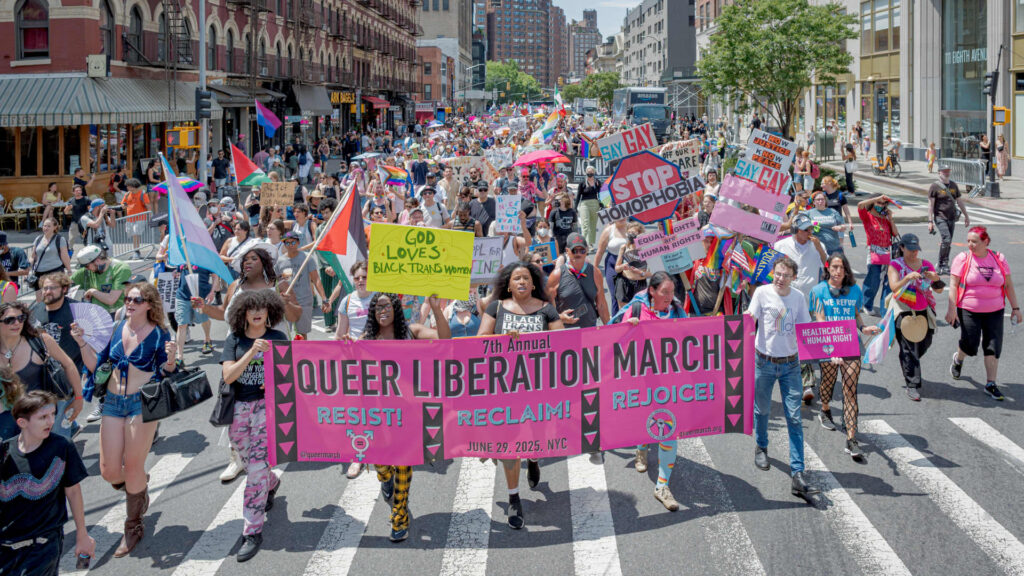
Participants marched in the Reclaim Pride Coalition’s seventh annual Queer Liberation March in New York on June 29, 2025, against a backdrop of increasing anti-LGBTQ+ rhetoric in the U.S. and ongoing trade tensions. Canadian citizen Robert Sharp, who had planned to visit Provincetown, Massachusetts—one of America’s most LGBTQ+-friendly destinations—for a friend’s milestone birthday, decided to change his plans. The decision was influenced by the political climate and President Donald Trump’s tariff policies.
“Do we want to have that stress before going on vacation? Or do we want to support our own country?” Sharp pondered. Instead of traveling to the U.S., Sharp and his group opted for Montreal. Additionally, Sharp and his partner canceled plans to visit Chicago or Fort Lauderdale, choosing instead a Canadian road trip between Calgary and Vancouver. “We’ve been hit hard in Canada with tariffs, and there’s been a real sense of patriotism up here,” Sharp explained, emphasizing their decision to support the Canadian economy.
Decline in International Travel to the U.S.
Sharp’s change in plans mirrors a broader trend of international travelers reconsidering their U.S. visits. According to the International Trade Administration, foreign visitors to the U.S. by air dropped 10% in March compared to the previous year. Including land border crossings, inbound visitors fell 14% during the same period. Oxford Economics projects that spending by international visitors to the U.S. will decrease by $8.5 billion this year, driven by negative perceptions of U.S. trade and immigration policies.
Among the LGBTQ+ community, the travel platform misterb&b reported a 66% decline in bookings from Canadian users and a 32% decline from European users between February and April, compared to the same timeframe last year. The platform saw a 22% increase in bookings in blue states but a 9% decline in red states, with notable decreases in cities like Salt Lake City, Phoenix, and Austin, Texas.
Misterb&b CEO Matthieu Jost noted, “LGBTQ+ individuals appear to be continuing to spend on vacations, but they’re changing their destinations.”
The Impact of Political Climate on LGBTQ+ Travel
Sharp, who owns the LGBTQ-friendly travel company Out Adventures, is not alone in altering travel plans. In February, Egale Canada, an LGBTQ+ advocacy group, announced its members would not participate in U.S. conferences or events this year, including WorldPride in Washington, D.C. Helen Kennedy, Egale Canada’s executive director, cited safety concerns as a primary reason.
During his second term, Trump has signed several executive orders targeting transgender individuals, including preventing them from serving openly in the military and attempting to exclude transgender athletes from girls’ and women’s sports. Another order recognizing only two sexes prompted countries like Denmark, Finland, and Germany to issue travel advisories for LGBTQ+ travelers to the U.S., particularly transgender individuals. Canada also updated its travel guidance for passports with an “X” gender marker.
Kennedy highlighted economic considerations as another factor. “People talk about Canada and the U.S. having a long history of being incredible neighbors. And yes, we do, but that’s based on economic interests a lot of the time,” she remarked. “When you put that human element with the economic element, then you think, well, OK, why would I go there?”
The purchasing power of LGBTQ+ consumers is estimated at $1.4 trillion, according to a 2022 Pride Co-Op study.
The Economic Influence of LGBTQ+ Travelers
The global LGBTQ+ tourism market was valued at $296.8 billion in 2023 and is expected to more than double to $634.9 billion by 2033, according to Market.US. Research from Arival Travel indicates that LGBTQ+ travelers tend to have higher household incomes and spend more on activities and tours than other demographics.
John Tanzella, CEO of the International LGBTQ+ Travel Association, noted a pullback in international LGBTQ+ travel to the U.S. He reported hesitations from international members about attending the organization’s global convention in Palm Springs, California. “They don’t feel welcome here, so why come and spend their money here?” Tanzella questioned. “It affects airlines and hotels, but it also impacts other businesses, whether it’s barber shops, restaurants, bars, or spas. Many communities rely on tourists to come in and spend their money.”
Pride Celebrations Continue Amid Challenges
Despite the challenges, Pride celebrations continue across the U.S., showcasing resilience and solidarity within the LGBTQ+ community. Participants, including GLIDE President Gina Fromer, took part in the 2025 San Francisco Pride Parade on June 29, 2025. Pride flags were prominently displayed at the Pride on the Pier boat parade, part of the World Pride festival at the DC Wharf in Washington.
As the political and economic landscapes evolve, the travel decisions of international LGBTQ+ individuals will likely continue to reflect broader societal shifts. The focus remains on supporting inclusive destinations that align with their values, even as they navigate complex challenges.







